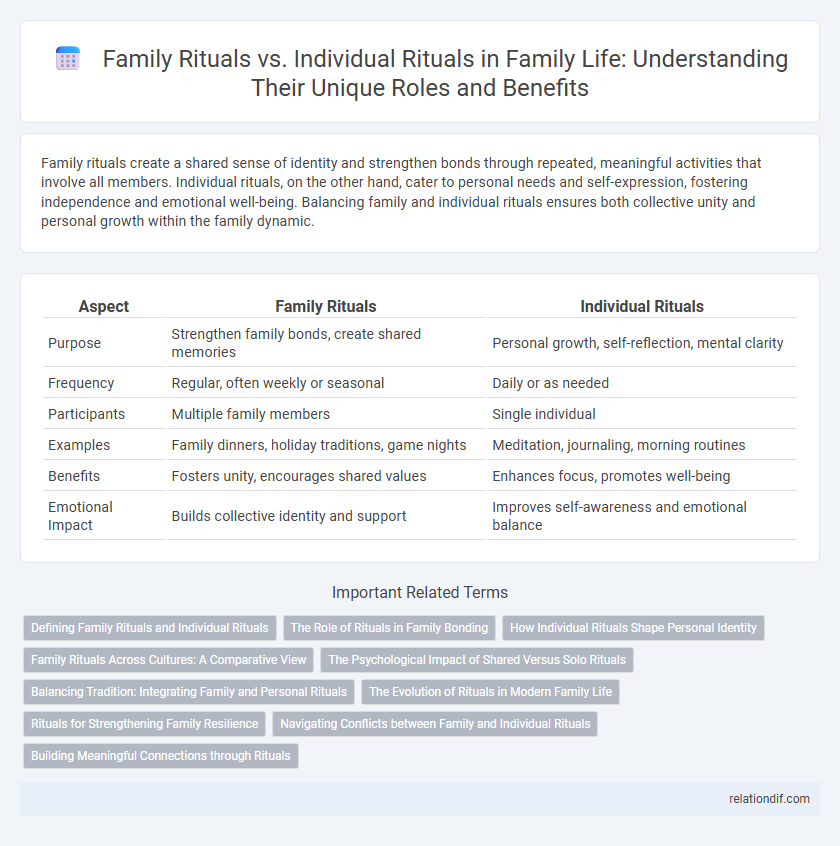Family rituals create a shared sense of identity and strengthen bonds through repeated, meaningful activities that involve all members. Individual rituals, on the other hand, cater to personal needs and self-expression, fostering independence and emotional well-being. Balancing family and individual rituals ensures both collective unity and personal growth within the family dynamic.
Table of Comparison
| Aspect | Family Rituals | Individual Rituals |
|---|---|---|
| Purpose | Strengthen family bonds, create shared memories | Personal growth, self-reflection, mental clarity |
| Frequency | Regular, often weekly or seasonal | Daily or as needed |
| Participants | Multiple family members | Single individual |
| Examples | Family dinners, holiday traditions, game nights | Meditation, journaling, morning routines |
| Benefits | Fosters unity, encourages shared values | Enhances focus, promotes well-being |
| Emotional Impact | Builds collective identity and support | Improves self-awareness and emotional balance |
Defining Family Rituals and Individual Rituals
Family rituals consist of shared activities or traditions that reinforce bonds, create a sense of belonging, and provide stability across generations, often involving celebrations, meals, or holiday customs. Individual rituals are personal practices or routines performed by one person to foster self-awareness, reduce stress, or instill discipline, such as meditation, journaling, or exercise. Both family and individual rituals play essential roles in emotional well-being, with family rituals emphasizing collective identity and individual rituals supporting personal growth.
The Role of Rituals in Family Bonding
Family rituals create shared experiences that strengthen emotional connections and foster a sense of belonging among members. Individual rituals offer personal stability and self-reflection but can also complement family traditions, enriching overall family cohesion. Research indicates families engaging regularly in joint rituals report higher levels of trust, communication, and support.
How Individual Rituals Shape Personal Identity
Individual rituals, such as daily journaling or morning meditation, play a crucial role in shaping personal identity by fostering self-awareness and emotional resilience. These personalized practices reinforce core values and beliefs unique to each person, distinguishing their sense of self from broader family traditions. Over time, individual rituals contribute to a deeper understanding of one's purpose and priorities, enhancing personal growth within the context of familial relationships.
Family Rituals Across Cultures: A Comparative View
Family rituals, such as shared meals, holiday celebrations, and rites of passage, play a crucial role in strengthening bonds and cultural identity across diverse societies. For example, Japanese families observe the New Year's Osechi-ryori meal, while Mexican families celebrate the Dia de los Muertos together, highlighting collective participation in maintaining traditions. These shared practices contrast with individual rituals, which often serve personal reflection, yet both contribute to emotional well-being and social cohesion.
The Psychological Impact of Shared Versus Solo Rituals
Shared family rituals foster a strong sense of belonging and collective identity, reducing stress and enhancing emotional resilience through consistent social support. Individual rituals promote personal autonomy and self-regulation, aiding in emotional grounding and mental clarity during times of change. Both shared and solo rituals contribute uniquely to psychological well-being by balancing communal connection with individual self-care.
Balancing Tradition: Integrating Family and Personal Rituals
Balancing tradition involves integrating family rituals, such as shared meals and holiday celebrations, with individual rituals like personal meditation or journaling to maintain both collective and personal well-being. Family rituals strengthen bonds and cultural identity, while individual rituals support personal growth and emotional health. A harmonious blend ensures a nurturing environment that honors heritage while fostering self-expression and resilience.
The Evolution of Rituals in Modern Family Life
The evolution of rituals in modern family life highlights a shift from traditional, collective family ceremonies to a blend of shared and individual practices that reflect personal identities and schedules. Family rituals continue to foster connection and continuity, while individual rituals accommodate diverse lifestyles and personal growth within the household. This dynamic interplay supports both communal cohesion and individual expression, adapting to contemporary social changes and technological advancements.
Rituals for Strengthening Family Resilience
Family rituals such as weekly dinners, holiday traditions, and shared storytelling create a stable framework that fosters emotional security and collective identity, crucial for strengthening family resilience. In contrast, individual rituals like personal journaling or meditation support self-regulation and emotional well-being, indirectly benefiting family dynamics by promoting healthier interactions. Combining family and individual rituals enhances adaptive coping mechanisms and reinforces the family unit's capacity to navigate stress and adversity effectively.
Navigating Conflicts between Family and Individual Rituals
Balancing family rituals and individual rituals often requires open communication and mutual respect to navigate conflicts effectively. Family rituals, such as shared meals or holiday traditions, foster collective identity, while individual rituals support personal expression and well-being. Prioritizing flexibility and empathy helps reconcile differences, ensuring that both family cohesion and individual needs are honored.
Building Meaningful Connections through Rituals
Family rituals create shared experiences that strengthen emotional bonds and foster a sense of belonging, enhancing communication and trust among members. Individual rituals support personal growth and self-awareness, which contribute to healthier relationships within the family dynamic. Combining both types of rituals cultivates a balanced environment where meaningful connections thrive, promoting resilience and well-being.
family rituals vs individual rituals Infographic

 relationdif.com
relationdif.com